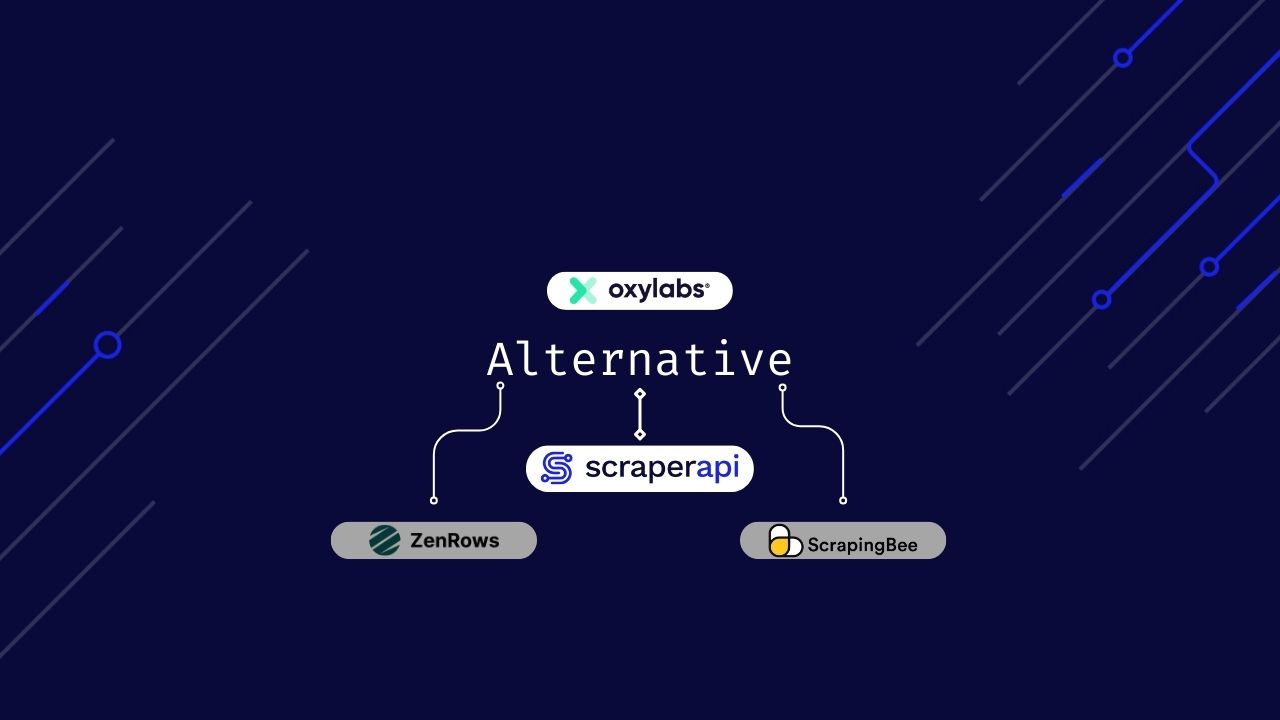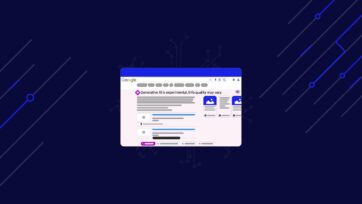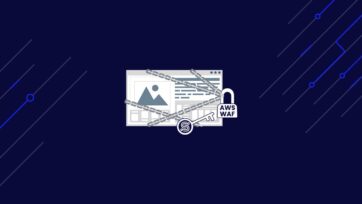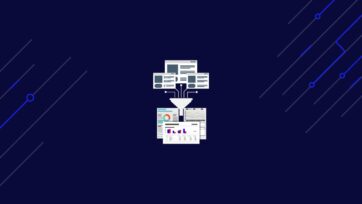Oxylabs is one of the top residential proxy companies offering a full suite of web scraping and data collection solutions. Yet, its services may not be the perfect fit for every business, especially those seeking more cost-effective or specialized options.
In this article, we’ll explore five alternatives to Oxylabs that excel in e-commerce data collection at scale.
TL;DR: Oxylabs Alternatives for Product Data Scraping [Compared]
If you’re looking for alternatives to Oxylabs for e-commerce data collection, here are the top five options to consider:
| Provider | Best For | Starting Price | Key Features |
| ScraperAPI | Best All-Around Alternative | $49/month | – Smart proxy rotation- On-demand JavaScript rendering- Structured data endpoints for major ecommerce sites- Built-in scheduler |
| Bright Data | Feature-Rich but Expensive | $500/month | – Extensive proxy network- For sale datasets- Advanced geotargeting options- Web scraping IDE- API Marketplace |
| Apify | Workflow Automation | $49/month | – Library of pre-built scrapers- Scalable cloud infrastructure- Workflow automation- Customizable scrapers |
| ScrapingBee | User-Friendly API | $49/month | – Real browser rendering- JavaScript execution- Automatic proxy rotation- User-friendly API |
| Zyte | AI-Powered Extraction | Pay-as-you-go | – AI integration- Automated browser rendering- Smart proxy management- Cloud hosting for scalability |
ScraperAPI suite of ecommerce APIs lets you get product, review, and seller data from major marketplaces in JSON and CSV format.
The Best OxyLabs Alternatives for E-commerce Scraping
Before you commit to Oxylabs, it’s worth exploring the competition. Let’s break down the top alternatives, comparing their pricing, features, and ease of use to help you make the right decision.
1. ScraperAPI [The Best All-Around Ecommerce Scraper]
ScraperAPI offers the perfect blend of pricing, features, and ease of use, making it a top alternative to Oxylabs.
It’s built specifically to scrape dynamic ecommerce sites like Amazon, Walmart, Google Shopping, and eBay, to name a few, without the hassle of manually managing proxies, CAPTCHAs, or JavaScript rendering.

Getting started with ScraperAPI is also very easy for non-developers, as all users need is an API key and URL to start scraping.
Key features
- Intelligent proxy and header rotation
- Smart javaScript rendering
- Structured data endpoints for major e-commerce sites
- DataPipelines
- Geotargeting for all locations
- Advanced CAPTCHA handling
- Excellent customer support
Pricing Comparison
The pricing structures and product offerings for ScraperAPI and Oxylabs are pretty similar. Oxylabs charges customers based on the number of “results”, which are equivalent to successful responses (responses with 2xx status codes).
They both have entry plans starting at around $49, so let’s compare their business plans for larger-scale ecommerce scraping and see what each one offers.
| Feature | ScraperAPI (Business Plan) | Oxylabs(Advanced Plan) |
| Monthly Cost | $299 | $299* |
| Scraped Pages | 600,000 requests | 124,800 requests |
| Concurrent Threads | 100 | 30 |
| Cost per 1,000 requests | $0.50 | $2.40 |
| JavaScript Rendering | On-Demand | Always on |
| Ultra-premium proxies | Yes | – |
| Geotargeting | Worldwide | All Locations |
Note: Oxylabs’ Advanced Plan is $249/month for 104,000 results. By adding $50 (at $2.40 per additional 1,000 results), you get an extra 20,800 results, totaling 124,800 results for $299/month.
Key Takeaways
- ScraperAPI offers nearly 5 times more successful ecommerce requests than Oxylabs at the same price point.
- With ScraperAPI, the cost per 1000 requests at $0.50 is considerably lower than Oxylabs at $2.40.
- ScraperAPI allows for 100 concurrent threads compared to Oxylabs’ 30, allowing for faster and easier data collection.
Scraping Unprotected Domains vs Protected Sites
For less complex scraping needs, the difference is even more pronounced, each ScraperAPI request to an unprotected domain (domains not using bot blockers like DataDome or PerimeterX) costs 1 API credit, meaning you can scrape a whopping 3,000,000 results at only $299/month. On the other hand, Oxylabs still offers the same 124,800 results for $299/month.
When dealing with protected sites, each ScraperAPI request costs 10 API credits, allowing for300,000 results at $299/month while Oxylabs pales in comparison.
Pros vs. Cons
| Pros | Cons |
| Cost-effective and predictable pricing | Limited geotargeting in lower tiers |
| Simple and easy-to-use API | No PAYG pricing |
| Transparent pricing | |
| Excellent for ecommerce (SDEs) & DataPipelines | |
| API playground for testing | |
| Advanced geotargeting options & ultra premium proxies | |
| Webhook data delivery for smoother integration to already existing projects |
Why Choose ScraperAPI
When it comes to scraping performance, both services deliver on what they promise and offer reliable scraping solutions. However, here are a few reasons why ScraperAPI nicks it:
- Easy-to-use API: Start scraping within minutes using a simple
get()request without additional software or complex setups. - Efficient proxy usage: ScraperAPI uses machine learning to intelligently rotate IPs and headers, reducing the need for expensive residential proxies.
- On-demand JavaScript rendering: Unlike Oxylabs, which always charges for JS rendering, ScraperAPI only applies this when necessary, reducing costs for sites that don’t rely on JS to inject content.
- Structured Data Endpoints (SDEs): ScraperAPI simplifies ecommerce data extraction with pre-built ecommerce endpoints. You can scrape any product or search page on major ecommerce sites like Amazon, Walmart, or Google Shopping by submitting a list of ASINs, product IDs, or search queries. ScraperAPI will then return the page’s content in JSON or CSV format.
- DataPipeline: DataPipeline is ScraperAPI’s hosted scraping scheduler. It allows you to build and automate entire recurrent scraping projects, including projects using ScraperAPI’s ecommerce APIs. You can use this tool via a visual interface or its dedicated endpoints.
Note: One major downside of Oxylabs is that if you need access to more than one of its web scraping clusters, you’ll need to pay for a separate plan for each. The credits available are restricted to the package you paid for and are not transferable to other scrapers. This is not the case of ScraperAPI; with one plan, you get access to all ScraperAPI’s features and tools.
ScraperAPI lets you scrape 5x more ecommerce data at a lower price.
2. Bright Data [Feature-Rich but Expensive]
Bright Data is known for its large pool of residential, mobile, and
datacenter proxies. It’s a solid choice for ecommerce businesses that require ready-to-use datasets or complex web scraping configurations, but it comes at a high price.
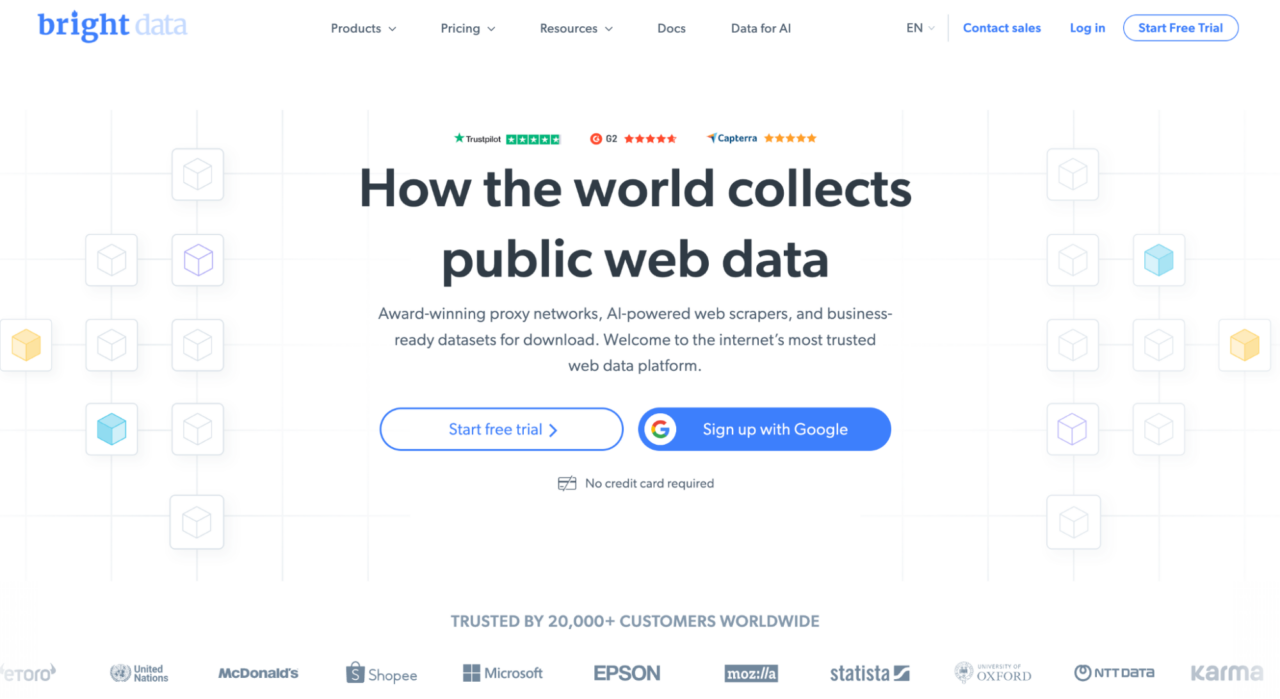
While Bright Data offers an extensive feature set and powerful tools, the
pricing can be pretty steep for small and medium businesses. However, features like its pre-made datasets can save time, particularly when you need historical ecommerce data.
Key Features
-
- Extensive proxy network including residential, mobile, and datacenter IPs
-
- API Marketplace with 65+ specialized APIs, including popular ecommerce sites
-
- Web Scraping IDE for custom scraper development
-
- Ready-to-use web scraping templates
-
- Great customer service with live support
-
- Dataset Marketplace for ready-to-use ecommerce data
-
- Advanced geotargeting options
Pricing Comparison
Pricing-wise, Oxylabs seems to have a more traditional pricing structure,
similar to other services in the industry. You pay a monthly fee for a set
amount of requests and other relevant resources, such as proxy rotation and access to specific APIs.
Bright Data, on the other hand, still relies heavily on its sales team. This
process can be a major turn-off for users who want to manage everything themselves and start using the product right away without needing specific quotes.
Their pricing is also considerably above the market average, indicating that Bright Data is focused on high-volume scraping users.
That said, beyond its datasets, it’s hard to justify its cost with
alternatives like ScraperAPI available, which provide the same – or even
better at times – bypassing features and a comprehensive set of ecommerce scraping tools at a more affordable price.
| Feature | Oxylabs(Advanced Plan) | BrightData (Business Plan) |
| Monthly Cost | $249 | $999 |
| API Credits/Scraped Pages | 104,000 pages | Varies based on proxy type and usage |
| Concurrent Threads | 30 | Unlimited |
| JavaScript Rendering | Always on | Available (additional cost) |
| Geotargeting | All Locations | Extensive country and city-level |
| Dataset Marketplace | Limited (from $1000) | Extensive (from $5000) |
Pros vs. Cons
| Pros | Cons |
| Extensive proxy network | Expensive, starting at $500/month with potential additional bandwidth costs |
| Advanced features like Web Unlocker and web scraping IDE for custom solutions |
Complex pricing structure |
| Comprehensive geotargeting options | Technically complex |
| Offers ready-to-use e-commerce datasets | Dataset pricing starts higher than Oxylabs |
Why Choose BrightData over Oxylabs
BrightData stands out with its API Marketplace, offering specialized endpoints for over 20 popular e-commerce sites, including Amazon and Walmart.
The Web Scraping IDE, while potentially clunky, provides flexibility for
custom ecommerce scraping solutions, while the dataset marketplace, starting from $5000, offers a wide range of ready-to-use ecommerce datasets, albeit at a higher price than Oxylabs’ limited offering.
While BrightData’s solutions are generally more expensive than Oxylabs, they offer more specialized tools and data options for ecommerce, potentially providing better value for businesses looking to buy ready-to-use datasets instead of doing web scraping themselves.
Why ScraperAPI Might Be a Better Choice
-
- Lower Cost: ScraperAPI offers a more affordable entry point
for businesses of all sizes, with better cost-to-data ratios.
- Lower Cost: ScraperAPI offers a more affordable entry point
-
- Simplicity: Easier to use with straightforward pricing and
no additional bandwidth costs.
- Simplicity: Easier to use with straightforward pricing and
Note:
See how BrightData compares to ScraperAPI
3. Apify [Best for Workflow Automation]
Apify is a comprehensive cloud-based platform
that provides a suite of web automation and data extraction tools. It allows users to build, run, and manage large-scale web scraping and automation tasks.
While it’s more geared towards developers who want to customize their web scrapers, it’s an excellent choice for businesses looking to automate their ecommerce data collection workflows.

Key Features
-
- Extensive library of ready-made scrapers (called Actors) for ecommerce
platforms
- Extensive library of ready-made scrapers (called Actors) for ecommerce
-
- Cloud infrastructure for scalable ecommerce data collection
-
- Workflow automation for complex ecommerce data extraction tasks
-
- Option to create and monetize custom Actors and APIs
-
- Community Support and Documentation
Pricing Comparison with Oxylabs
Let’s compare Apify’s Scale Plan with Oxylabs’ Advanced Plan to see how they stack up for ecommerce scraping.
| Feature | Oxylabs(Advanced Plan) | Apify (Scale Plan) |
| Monthly Cost | $249 | $499 then PAYG |
| API Credits/Scraped Pages | 104,000 pages | 1,600 Compute Units (CUs)* |
| Concurrent Threads | 30 | Scalable |
| JavaScript Rendering | Always on | Available |
| Geotargeting | All Locations | Extensive country and city-level |
| Pre-built Ecommerce Scrapers | Limited | Extensive Library of Actors |
| Cloud services | Limited | Extensive |
| JavaScript Rendering | Included | Included |
*Compute Units (CUs) represent the computing resources used to execute
Actors. The number of pages you can scrape depends on the complexity of your tasks. For the Scale plan, Apify charges a rate of $0.3 / CU.
Pros vs. Cons
| Pros | Cons |
| Excellent for automating complex workflows | Costs can quickly accumulate |
| Extensive library of pre-built Actors for ecommerce scraping | Pricing based on compute units can be complex |
| Ability to build, host, and monetize your own Actors | Steeper learning curve for non-developers |
| Strong community support and documentation |
Why Choose Apify over Oxylabs?
-
- Workflow automation: If your ecommerce business requires
integrating web scraping into automated workflows, Apify excels with its
scheduling capabilities, integrations, and extensive library of Actors.
- Workflow automation: If your ecommerce business requires
-
- Customization and extensibility: Apify allows you to
customize and build your own scraping scripts, offering greater flexibility
for specialized ecommerce data collection tasks.
- Customization and extensibility: Apify allows you to
Why ScraperAPI Might Be a Better Choice
If you are primarily focused on efficient, high-volume ecommerce data
collection with minimal setup and lower costs, ScraperAPI may be the better choice for you.
While Apify offers powerful features for workflow automation and
customization, its pricing for large-scale data collection is less competitive compared to ScraperAPI’s DataPipeline.
With DataPipeline, you’re able to build and automate entire web scraping
projects using both URLs – so the tool will return the HTML of the target page – or any of the ready-made endpoints to collect product data from ecommerce sites in JSON or CSV format. These features makes it easier to schedule recurring scraping jobs with ScraperAPI without complicated setups.
However, if your team is looking to build custom scrapers and offer them for sale, Apify marketplace is the best choice.
4. ScrapingBee [User-Friendly Web Scraping API]
ScrapingBee
is a popular choice among businesses seeking efficient data extraction
solutions for ecommerce websites. With its user-friendly API and advanced features, ScrapingBee simplifies the process of gathering product details, pricing information, and reviews from various ecommerce platforms.
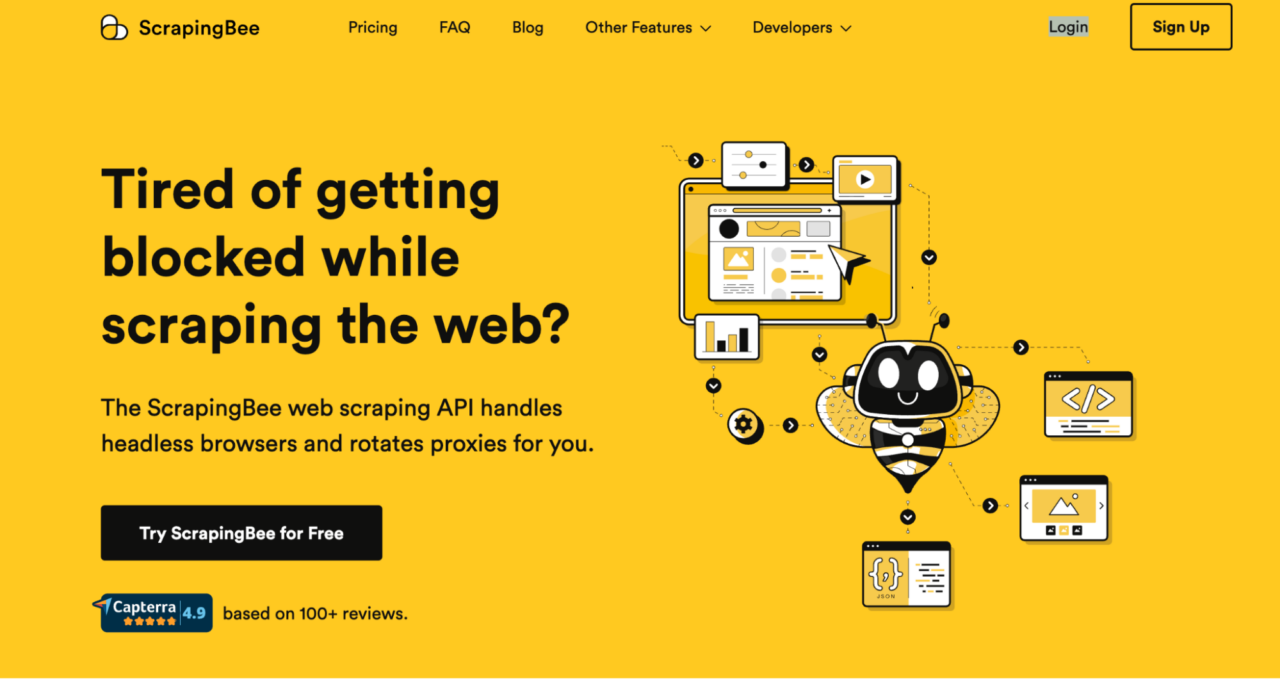
Whether you’re analyzing the market, tracking competitor prices, or optimizing your product offerings, ScrapingBee provides the necessary tools and capabilities to effortlessly extract valuable ecommerce data.
Key Features
-
- Real browser rendering
-
- JavaScript execution
-
- Large proxy pool with automatic rotation
-
- User-friendly API
-
- Customizable parameters
-
- CAPTCHA handling
-
- Geotargeting options
Pricing Comparison with Oxylabs
Let’s compare ScrapingBee’s Business Plan with Oxylabs’ Advanced Plan,
focusing on their applicability to ecommerce data collection.
| Feature | Oxylabs(Advanced Plan) | ScrapingBee (Scale Plan) |
| Monthly Cost | $249 | $249 |
| API Credits/Scraped Pages | 104,000 pages | 300,000 pages* |
| Concurrent Threads | 30 | 100 |
| Geotargeting | All Locations | Available |
| Proxy Management | Included | Automatic Rotation |
| Custom JavaScript Execution | Not specified | Yes |
| JavaScript Rendering | Included | Included |
* ScrapingBee charges 10 API credits for requests using premium proxies, which you’ll need to bypass ecommerce sites’ bot blockers.
Making the calculation of 3M API credits (number of API credits compressed in the “scale plan”) divided by 10, we get the number of ecommerce pages you can scrape with the scale plan – of course, for ecommerce sites using JS to inject content, the cost per request rises to 25, so the number of scraped pages significantly drops for sites like Google Shopping.
Pros vs. Cons
| Pros | Cons |
| Handles JavaScript rendering and headless browsers | Lack some specialized ecommerce features |
| User-Friendly API | Less suitable for very high-volume scraping compared to some alternatives |
| Affordable pricing for small projects | Concurrency limits can be restrictive on lower-tier plans |
| Offers a large proxy pool for effective IP rotation |
Why Choose ScrapingBee over Oxylabs:
-
- Cost-Effectiveness: ScrapingBee offers a more affordable
solution for comparable ecommerce scraping capabilities.
- Cost-Effectiveness: ScrapingBee offers a more affordable
-
- User-Friendly API: Simpler integration and usage,
especially beneficial for teams with varying technical expertise.
- User-Friendly API: Simpler integration and usage,
-
- JavaScript Handling: Superior capabilities in scraping
dynamic ecommerce content and executing custom JavaScript scenarios.
- JavaScript Handling: Superior capabilities in scraping
However, due to its pricing structure, ScrapingBee is a good option for small projects and not for high-volume scraping tasks.
Why ScraperAPI Might Be a Better Choice:
-
- Specialized ecommerce endpoints: ScraperAPI offers
optimized endpoints for major e-commerce sites, including Amazon, Walmart,
and Google Shopping, potentially providing more efficient data extraction.
- Specialized ecommerce endpoints: ScraperAPI offers
-
- Higher volume capacity: ScraperAPI’s plans offer more
successful requests at a lower price point, beneficial for large-scale
ecommerce data collection.
- Higher volume capacity: ScraperAPI’s plans offer more
-
- Simpler Integration: While both are user-friendly,
ScraperAPI’s single API approach can be even more straightforward to
implement.
- Simpler Integration: While both are user-friendly,
Due to ScrapingBee’s pricing structure, you could end up paying more for the same features.
5. Zyte [AI-Powered Extraction]
Zyte is another fine choice for web scraping pros who like all-in-one platforms. Zyte API provides a comprehensive solution for extracting data from ecommerce websites.

It uses AI technology and advanced tools to streamline the process. With a focus on efficiency and accuracy, Zyte empowers businesses to gather product information, pricing data, and customer reviews from a wide range of ecommerce platforms.
Key Features
- Impressive AI integration
- Scrapy Cloud (A cloud-based scraping platform)
- Smart proxy manager
- Geolocation
- Legal compliance assurance.
Pricing Comparison with Oxylabs
Let’s compare Zyte’s Pricing Plan with Oxylabs’ Advanced Plan, focusing on their applicability to ecommerce data collection.
| Feature | Oxylabs(Advanced Plan) | Zyte |
| Monthly Cost | $249 | Pay-as-you-go plans, and custom enterprise solutions |
| API Credits/Scraped Pages | 104,000 pages | Unspecified |
| Concurrent Requests | 30 | Unspecified |
| Compliance Assessment | No | Free |
| Proxy Management | Included | Available |
| AI-Powered Scraping | Limited | Advanced |
Pros and Cons
| Pros | Cons |
| Advanced AI-driven data extraction | Higher price point and complex pricing |
| Strong support and compliance | Longer setup time |
| High success rate | May be complex for beginners |
| Cloud hosting and scalability | Hard to estimate expenses |
Why Choose Zyte over Oxylabs?
- Advanced AI Features: Zyte’s AI integration enhances scraping capabilities for complex ecommerce platforms.
- Scrapy Integration: As the creators of Scrapy, Zyte offers superior integration and support for this popular scraping framework.
Why ScraperAPI Might Be a Better Choice
- Cost-effectiveness: ScraperAPI often provides more requests per dollar, especially for high-volume scraping needs.
- Specialized ecommerce endpoints: ScraperAPI’s optimized SDEs for major ecommerce sites can be more efficient for specific ecommerce platforms such as Amazon, Walmart, etc.
- Predictable Pricing: ScraperAPI’s pricing structure is more transparent and easier to forecast for varying scraping volumes. You can even use the API playground to estimate the API credit cost of your project.
Don’t get surprises on your bills. ScraperAPI’s transparent pricing makes it easier to forecast your project’s cost.
Considerations for Choosing the Right Ecommerce Scraper API
Selecting the right e-commerce scraper API is essential for efficient data collection and overall business success. Here are the key factors to consider:
- Cost-Effectiveness: Evaluate each provider’s overall cost, including any hidden fees, and weigh it against the features and benefits to ensure you’re getting the best value.
- Scalability: Choose an API that can grow with your business. As your data needs expand, the scraper should handle increased volumes without compromising performance.
- Reliability and Uptime: Opt for a provider with a proven track record of minimal downtime. Reliable scraping ensures you have consistent access to the data you need.
- Compliance and Legal Considerations: To avoid legal complications, verify that the provider adheres to data privacy regulations and respects website terms of service.
- Integration and Compatibility: The API should seamlessly integrate with your current setup and support the programming languages and tools you currently use.
- Support and Documentation: Responsive customer support and comprehensive documentation can save you time and help resolve issues quickly.
By keeping these considerations in mind, you can select an ecommerce scraper API that meets your current needs and supports your business as it grows.
Wrapping Up: The Best Oxylabs Alternative for Ecommerce Scraping
Among these alternatives to Oxylabs, ScraperAPI stands out as the best option for ecommerce data collection due to its flexible and transparent pricing, efficient proxy management, and advanced features and bypassing techniques. With ScraperAPI, you can scrape more pages for less without getting interrupted.
Create a free account to receive 5,000 free API credits, and start collecting data in minutes. To learn more about ScraperAPI and its product offerings, visit the following resources:

